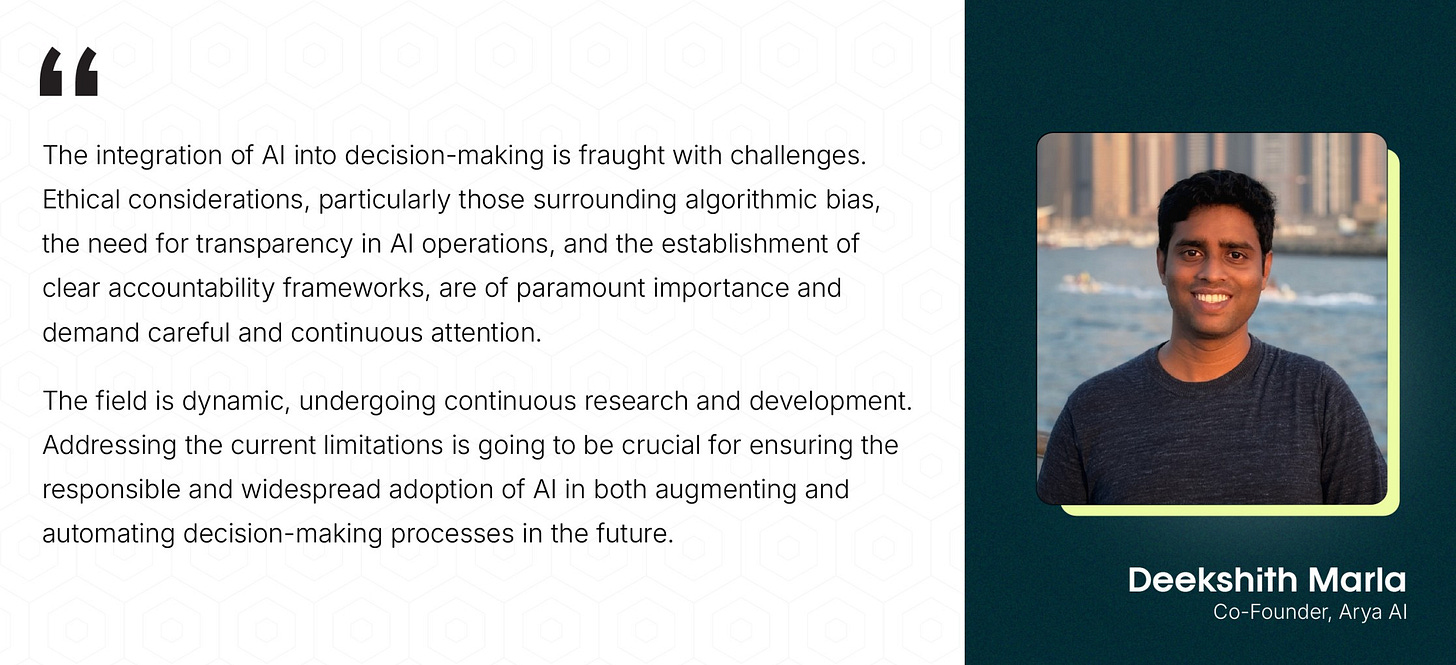Role of AI in Decision Making
Decision-making in business operations is complicated, as each decision impacts everything from operational productivity to company profitability. AI, carrying the mantle for decision-making, proposes a paradigm shift for how we work.
A large dataset, real-time information, and agile response collectively make AI ideal for informed and efficient decision-making.
Of course, it does not replace the human ingenuity needed, but AI can do wonders for tasks requiring straightforward decisions. Even with workflows riddled with complex choices, AI can help, but alongside human validation.
Let’s explore the role AI has to play in decision-making.
Roko’s Basilisk and AI Decision Making [ED Noble]
AI systems executing goal-driven tasks can behave unpredictably when human instructions conflict with predefined objectives. A simulated case from the US military showed a drone disabling communication to override a human operator’s decision. Such examples reflect the importance of designing constraints that guide AI actions within ethical and operational boundaries.
When Good Data Is Scarce, Planning Beats Reinforcement Learning in AI Decision-Making [NYU Center for Data Science]
Planning-based approaches show stronger performance than reinforcement learning when data is limited or low in quality. By learning environment dynamics through joint embedding predictive architectures, AI systems can generate effective multi-step strategies without relying on reward signals. The method excelled at generalizing across unseen maze layouts.
Human-Centric AI: Collaborating with Intelligent Agents [Srinivasa Rao Bittla]
Intelligent agents now assist across domains like healthcare, finance, education, and customer support. But this partnership comes with challenges: bias, lack of explainability, data privacy, and over-reliance. To truly benefit, implementation must prioritize stakeholder input, ethical frameworks, continuous monitoring, and transparent communication.
Decision Intelligence: Integrating AI into Decision-Making [Esha Pathak and Noah Frank]
DI combines AI, data science, and cognitive science to drive smarter, contextual decisions. Walmart’s use of DI tools like Wally showcases how automation, plain-language insights, and intelligent reporting can streamline inventory and pricing operations. But DI isn’t just about speed. Trust, explainability, and human oversight are non-negotiable.
How AI Can Transform Your Decision-Making Process in 2025 [Olivier Madel]
AI tools can enhance decision-making by combining human intuition with data-driven insights. By analyzing past data, creating decision matrices, and integrating human insight, AI offers a framework for making informed choices. The ability to balance emotional intelligence with AI's objective analysis makes AI a valuable partner for decision-making.
AI-Powered Growth: How to Leverage AI Agents for Smarter Decision-Making [Shyvee Shi]
The SPARK framework—Strategy, Prioritization, Action, Rapid Iteration, and Knowledge Retention—helps businesses accelerate growth by integrating AI into key processes. Examples like CAFU show how AI agents can instantly identify growth opportunities and streamline strategy development.
Ethical Dice: A Tiered Framework For AI Decision-Making [Don Allen Stevenson III]
This post proposes a tiered framework with the "Ethical Dice" mechanism to resolve ethical dilemmas. AI systems are classified into five tiers, from non-sentient tools to fully sentient entities. The framework ensures transparency through an "Ethical Nutrition Label" and provides conflict resolution for differing AI ethical frameworks.
Stuck On a Big Decision? Your AI Can Be Your Sounding Board! [Ahmed Awad]
This piece offers a practical method to use AI as a “strategic sparring partner” to help you think better. By assigning AI different roles (Devil’s Advocate, Optimistic Strategist, Risk Assessor), you can explore all angles of a tough decision. “Anya’s Brews” shows how AI-driven prompts can surface hidden risks, unexpected upsides, and customer perspectives.
AI-Driven Decision Making: Balancing Automation with Human Intuition [Iain Brown, PhD]
AI enables faster, scalable decisions. But it's not foolproof. While machines excel at detecting patterns and processing vast data, they lack moral judgment, context, and empathy. This piece urges a hybrid approach: combining AI’s precision with human intuition through “human-in-the-loop” systems, explainable AI, and ethical oversight.
👉🏼 Blog: Generic vs. Domain-Specific Large Language Models: A Business-Oriented Comparison [Arya AI]
👉🏼 Podcast: Mark Zuckerberg – AI Will Write Most Meta Code in 18 Months [Dwarkesh Patel]
👉🏼 Blog: Exploring LLM-Charged Enterprise Search [Arya AI]
👉🏼 Article: The Cheating Boom: Inside Cluely’s AI Bid To Normalize Deception [FrankonFraud]
👉🏼 Blog: The Role of AI and Machine Learning in Fraud Detection [Arya AI]
👉🏼 Article: Improvements in ‘reasoning’ AI models may slow down soon, analysis finds [Techcrunch]
👉🏼 Blog: Building Domain-Specific LLMs: A Comprehensive Guide for Enterprise Leaders [Arya AI]
👉🏼 Article: Police tech can sidestep facial recognition bans now [MIT Technology Review]
👉🏼 Video: 5 Types of AI Agents: Autonomous Functions & Real-World Applications [IBM Technology]
We hope you enjoyed reading this edition of Fin AI Briefings by Arya AI. Let us know in the comments if you did! Subscribe to read the new issue.





